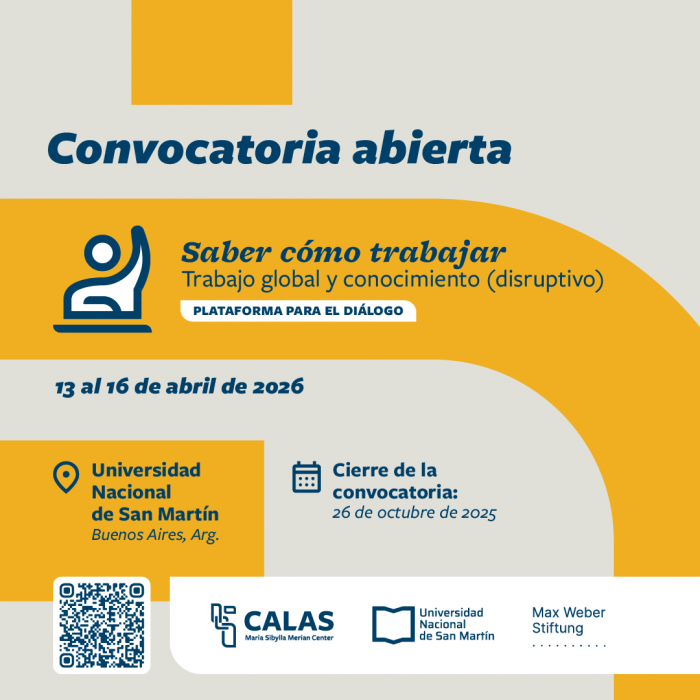This Platform for Dialogue, organized by CALAS in association with the Indian Branch of the Max Weber Foundation (MWF Delhi), seeks to understand work processes and capital-labor relations embedded in informational regimes. In this way, we highlight the dimensions of knowledge in the study of labor, focusing specifically on the knowledges and practices of workers and laboring populations, as opposed to the knowledge about labor generated by capital and the State. Broadly inspired by approaches that theorize these forms of knowledge as the basis of everyday acts of adaptation and resistance—including Michel de Certeau’s concept of tactics (2005) and James Scott’s notion of metis (1998)—the symposium will bring together researchers working on labor in a wide variety of (modern) regional and historical contexts—mostly, though not exclusively, in Latin America and the Caribbean and Asia—in order to inquire into the manifold ways of knowing labor employs to cope with and at times even counter the discipline it is subjected to.
To claim that there is a “knowing how to work” implies recognizing that workers not only possess the knowledge necessary to carry out the tasks assigned to them by employers, managers, or planners of labor regimes, but also hold knowledge to navigate the conditions and adversities they face. This enables them—at times—to participate in acts of resistance and disruption. Disruptive knowledge, in turn, can foster rebellion, as suggested by approaches inspired by Subaltern Studies (Guha 1983). Yet, conversely, it may in the Scottian sense be the form of knowing that actually makes the conditions of laboring both bearable and possible, by disrupting the failures of management and planning that mark the disciplining of labor. Paradoxically, the latter disruption constitutes the nucleus for acts of subversion that challenge disciplinary regimes, but frequently serve to stabilize actually existing conditions of discipline and hierarchy.
This symposium will be the fourth academic gathering organized by a growing group of researchers seeking to expand the scope of global labor studies by bringing together research from and about the “Global North” and the “Global South.” Each of the previous events focused on different themes within the study of labor. The first, organized in Bonn (2022), addressed labor from the perspective of coercion and confinement, while the second (organized in Rio de Janeiro, 2023) focused on the study of the service–servility–servitude triad. The third event, to be held in Delhi in 2025, will examine the role of intermediary actors and spaces in global labor regimes. Additionally, this proposal will establish points of dialogue with the CALAS Knowledge Laboratory “Transformations in the World of Labor in a Global Perspective”, soon to be inaugurated.
Within this framework, we invite researchers in the social sciences and humanities to consider the following questions: What role does disruptive knowledge play in shaping the world of work? How is "knowing how to work" connected to workplace resistance strategies? How do situations of coercion, precariousness, and informality reshape workers' practices?
We encourage contributions that examine the interconnected dimensions of work through the lenses of space, knowledge, informality, crisis, and mobility, particularly from the Global South. The following themes and subthemes are intended to guide the discussion. While these axes and subthemes are interwoven with the guiding questions above, they remain open to adjustment and expansion through collective debate.
- Territory, habitat, and labor: space, geography, and worlds of work
- Ecology and work: ecological crisis, materiality of nature and (regimes of) work
- Precarity, marginality, and informality: relations, contrasts, and strategies
- Internal and cross-border migrations and the labor market
- Circuits, spaces, and nodes: fairs, markets, and mobilities
- Education and labor
- Resistance, tactics, and workers’ antagonisms in historical perspective
Conveners: Silvia Grinberg (UNSAM, Buenos Aires / CALAS), Sebastian Schwecke (MWF Delhi).
Co-Conveners: Osnaide Izquierdo (University of Havana), Hans-Jürgen Burchardt (University of Kassel), Ronny Viales Hurtado (University of Costa Rica), Christian G. De Vito (Vienna), Michaela Dimmers (MWF Delhi), Hanne Osthus (University of Oslo), Paola Revilla Orias (Universidad Católica Boliviana, La Paz), Paulo Cruz Terra (Federal Fluminense University, Rio), Christian Strümpell (MWF Delhi)
Event and Application Guidelines:
The Platform will feature lectures by specialists and will be developed in a workshop format with discussion sessions in which participants are expected to present and discuss their own work.
Venue: Buenos Aires, Argentina
Date: April 13 to 16, 2026
- Target audience: graduates, researchers, activists, artists, and community leaders involved with the theme, working from diverse disciplines, knowledges, and practices, contributing their theoretical-methodological and/or experiential perspectives and reflections in and from the territories.
-Languages: Spanish and English (preferably), Portuguese.
- Application: Complete the online application form with the title and abstract of the proposal (300–400 words) and a short bio including professional background, publications, and/or relevant activities related to the theme.
- Deadline for proposals: October 26, 2025
The academic committee will select the works based on criteria of excellence. Applicants will be notified before December 15, 2025, regarding the evaluation of their submissions.
Funding: CALAS and the MWF Delhi will cover accommodation and meals. In addition, there will be a limited budget for travel expenses.
For further information: calasconosur@unsam.edu.ar


